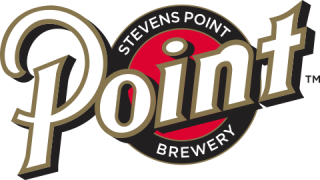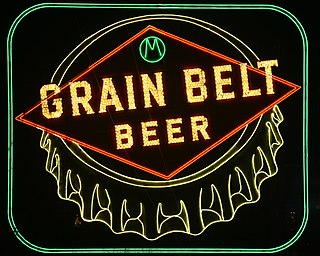
Stevens Point Brewery is a regional American brewery located in Stevens Point, Wisconsin. The brewery is the fifth-oldest continuously operating brewery and the third-oldest privately owned brewery in the nation.

Sleeman Breweries is a Japanese-owned Canadian brewery founded by John Warren Sleeman in 1988 in Guelph, Ontario. The company is the third-largest brewing company in Canada. Along with its own Sleeman brands, the company produces under licence the Stroh's family of brands, Maclays Ale and Sapporo Premium beers for sale in Canada. The company's parent Sapporo owns 4.2 per cent of Ontario's primary beer retailer The Beer Store.
The Stroh Brewery Company was a beer brewery in Detroit, Michigan. In addition to its own Stroh's brand, the company produced or bought the rights to several other brands including Goebel, Schaefer, Schlitz, Augsburger, Erlanger, Old Style, Lone Star, Old Milwaukee, Red River, and Signature, as well as manufacturing Stroh's Ice Cream. The company was taken over and broken up in 2000, but some of its brands continued to be made by the new owners. The Stroh's brand is currently owned and marketed by Pabst Brewing Company, except in Canada where the Stroh brands are owned by Sleeman Breweries.

Pittsburgh Brewing Company is a beer company headquartered in the Lawrenceville neighborhood of Pittsburgh, Pennsylvania, United States best known for producing brands such as Iron City Beer, I.C. Light Beer, I.C. Light Mango, Old German, and Block House Brewing. Until August 2009, all production was conducted at its Lawrenceville facility. From August 2009 to 2021, their products were contract brewed at City Brewing Company in the facility once produced Rolling Rock. On February 4, 2021, Iron City Beer's Instagram account announced that Pittsburgh Brewing Company would resume production of its own product in a new production brewery in Creighton, Pennsylvania, in the original Pittsburgh Plate Glass Company plant. At its opening, the facility is capable of producing 150,000 BBLs of beer annually.

The Jacob Leinenkugel Brewing Company, doing business as Leinenkugel's, is an American beer maker based in Chippewa Falls, Wisconsin. Leinenkugel was historically distributed only in the Upper Midwest, but is now available throughout all 50 states. The company is the seventh oldest brewery in the United States, and the oldest business in Chippewa Falls. It is a subsidiary of Molson Coors. It produces both traditional beers, including lagers and ales, as well as a popular line of shandys, which are a mixture of beer with fruit juices, such as lemonade.

The Pabst Brewing Company is an American company that dates its origins to a brewing company founded in 1844 by Jacob Best and was, by 1889, named after Frederick Pabst. It is currently a holding company which contracts the brewing of over two dozen brands of beer and malt liquor: these include its own flagship Pabst Blue Ribbon, as well as brands from (now-defunct) breweries, including:

Beer is manufactured by more than 7,000 breweries in the United States, which range in size from industry giants to brew pubs and microbreweries. The United States produced 196 million barrels (23.0 GL) of beer in 2012, and consumes roughly 28 US gallons (110 L) of beer per capita annually. In 2011, the United States was ranked fifteenth in the world in per capita consumption, while total consumption was second only to China.
City Brewing Company is a large brewery located in La Crosse, Wisconsin, USA. It is the former facilty of the Heileman Brewery, and can brew up to 7 million barrels of beer a year. Its twin-stream brewhouse can manage 16 brews of 1,100 barrels per day at the same time.

Grain Belt is a brand of beer brewed in the American state of Minnesota, by the August Schell Brewing Company. The beer has been produced in a number of varieties. Grain Belt Golden was the original style introduced in 1893. The current offerings are: Grain Belt Premium, first introduced in 1947; Grain Belt Premium Light; Grain Belt Nordeast, introduced on April 7, 2010; and the newest offering, Grain Belt Lock & Dam, introduced in 2016. It was originally produced by the Minneapolis Brewing Company which formed with the merger of four smaller brewers in 1891. Soon after introduction, Grain Belt became the company's flagship product. It was brewed at the original Grain Belt brewery in Minneapolis, Minnesota until 1976. A series of other owners followed, and Schell took over the product line in 2002.

The Olympia Brewing Company was a brewery in the northwest United States, located in Tumwater, Washington, near Olympia. Founded in 1896 by Leopold Friederich Schmidt, it was bought by G. Heileman Brewing Company in 1983. Through a series of consolidations, it was acquired by Pabst Brewing Company in 1999; the Tumwater brewery was closed in 2003.

Falls City Brewing Company was based in Louisville, Kentucky, USA. The company operated from 1905 until 1978. After the company closed the Falls City brand was purchased by differing groups of investors over the years.

Drewrys Brewing Company is an American brewery located in McHenry, Illinois founded in 1877.

The G. Heileman Brewing Company of La Crosse, Wisconsin, United States, was a brewer that operated from 1858 to 1996. It was ultimately acquired by Stroh's. From 1872 until its acquisition, the brewery bore the family name of its co-founder and brewer Gottlieb Heileman.
Hudepohl Brewing Company is a brewery established in Cincinnati, Ohio in 1885 by founder Ludwig Hudepohl II. Hudepohl was the son of Ludwig Hudepohl who emigrated from Malgarten, Kingdom of Hannover, in 1838. Ludwig II had worked in the surgical tool business before starting his brewery. Hudepohl combined with Schoenling Brewing Company in 1986. Today, the Hudepohl-Schoenling Brewing Company is a wholly owned subsidiary of Christian Moerlein Brewing Company.

The beers of the Caribbean are unique to each island in the region, although many are variants of the same style. Each island generally brews its own unique pale lager, the occasional stout, and often a non-alcoholic malta beverage. Contract-brewing of international beers is also common, with Heineken Pilsener and Guinness Foreign Extra Stout being the most popular. The beers vary between the islands to suit the taste and the brewing method used.

The Schmidt Artist Lofts is a historic former brewery for Schmidt Brewery. It is located in the West Seventh neighborhood of Saint Paul, Minnesota, United States. The building was vacant for 11 years until a massive community and developer effort resulted in a plan for a revitalization of the brewery's historic building into the creation of the Schmidt Artist Lofts in 2013.

The Christian Schmidt Brewing Company was an American brewing company headquartered in Philadelphia, Pennsylvania. Founded in 1860, it was the largest brewing company in the history of Philadelphia, producing nearly 4,000,000 barrels of beer a year in the late 1970s. When it closed in 1987, it marked the first time in over 300 years that there was no brewery operating in Philadelphia.

Milwaukee, Wisconsin, has one major brewery and dozens of microbreweries, and is home to several iconic beer brands from a variety of brewers. It has had an association with beer throughout its history, with the brewing industry getting its start prior to its official founding as a city and was nationally recognized as such by the end of the 19th century. This heritage can be found explicitly in its Major League Baseball team, the Milwaukee Brewers, and on recognizable beer brands such as Old Milwaukee and Milwaukee's Best. This recognition of Milwaukee as a brewing hub dates back to the early 20th century, and boasted the world's largest brewing capacity as late as 1981. The city is nationally recognized with the nickname "Brew City" due to its nearly two centuries of brewing heritage from multiple past major brewers including Miller Brewing Company, Pabst Brewing Company, and Joseph Schlitz Brewing Company. Today, through the ownership of MillerCoors, the city's largest brewery produces 10 million barrels of beer annually.
The Independent Milwaukee Brewery was an American brewery that was located on the south side of Milwaukee, Wisconsin from 1901 until 1964, when it was closed by G. Heileman Brewing Company which purchased the brewery in 1962. The brewery's signature brand was Braumeister. The trademark for this brand is currently held by Rhinelander Brewing Company.
The William Gerst Brewing Company was a beer-maker located in Nashville, Tennessee. Originally named the Nashville Brewing Company, which opened in 1859, the operation was purchased in 1890 and operated as the William Gerst Brewing Company. The Nashville Brewing Company was occasionally renamed, with other company names including the Nashville Brewery, Stifel & Pfeiffer Brewery, South Nashville Lager Beer Brewery, and Moerlein-Gerst Brewing Company. I 1893 it became the William Gerst Brewing Company, in a facility completely rebuilt on the same property, which remained in operation until the company closed in 1954.















